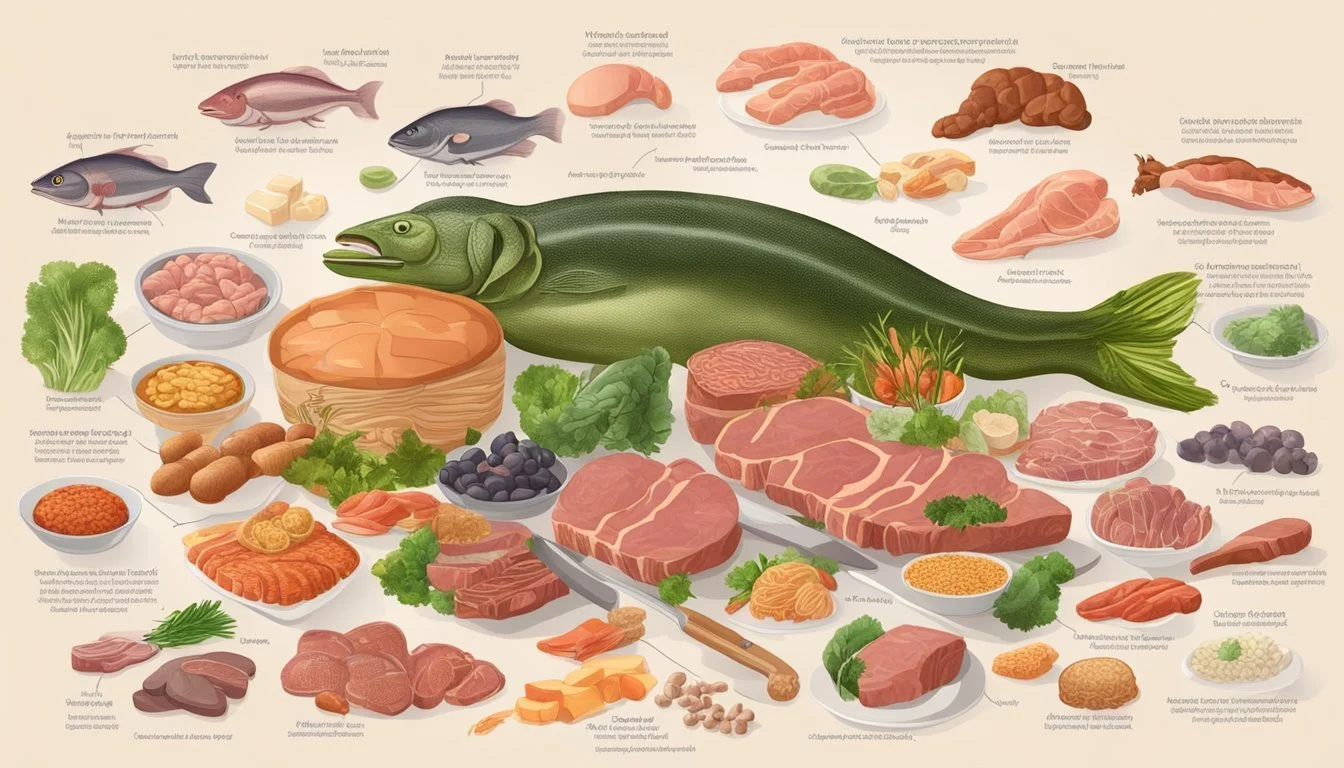The Carnivore Diet & Autoimmune Disease
Understanding Potential Impacts
This Article is Part Of Our Guide on the Carnivore Diet
Autoimmune diseases are chronic conditions in which the immune system mistakenly attacks the body's own cells and tissues. Conventional treatments often focus on immunosuppressive medications to reduce the immune response. However, dietary strategies have emerged as potential complementary approaches, fueling interest in specific diets such as the carnivore diet. The carnivore diet, a regimen consisting exclusively of animal products, is gaining attention for its purported benefits in reducing the symptoms associated with autoimmune disorders.
The premise of the carnivore diet's effectiveness against autoimmune diseases lies in its elimination of certain foods believed to trigger immune responses. By consuming only meats and animal products, this diet avoids foods that contain carbohydrates, sugars, fibers, and plant-based substances such as antinutrients and some toxins. Proponents suggest that the exclusion of these foods could dampen the immune system's overactivity characteristic of autoimmune conditions, thereby providing symptom relief.
It's essential to consider the carnivore diet's high protein and fat content, which some individuals report to be conducive to sustained energy levels and satiety. This restrictive dietary pattern may influence gut health and inflammation—factors linked to the pathogenesis of autoimmune diseases. However, rigorous scientific investigations are necessary to substantiate the diet's efficacy and safety, as current understanding is primarily based on anecdotal evidence and small-scale studies.
What Is the Carnivore Diet?
The Carnivore Diet is a dietary regimen that emphasizes the consumption of animal products and the exclusion of plant-based foods.
Origins of the Carnivore Diet
The Carnivore Diet has historical roots tracing back to indigenous populations and their meat-focused eating habits. It gained modern popularity as an extension of low-carb and ketogenic diets, with proponents arguing for the benefits of a diet mimicking that of early human carnivorous diets.
Basic Principles of Carnivore Eating
1. Food Selection:
Meat: This includes red meat, poultry, and fish as the main components.
Other Animal Products: Eggs and limited dairy products may be included.
2. Exclusions:
All forms of plant-based foods are excluded, which means no vegetables, fruits, grains, legumes, nuts (how long do nuts last?), or seeds.
Understanding Autoimmune Diseases
Autoimmune diseases occur when the immune system erroneously targets the body's own tissues. This can lead to inflammation, pain, and a variety of chronic health issues.
Common Types of Autoimmune Diseases
There are over 80 recognized autoimmune diseases. Among them:
Rheumatoid Arthritis (RA): Affects the joints, causing pain and swelling.
Juvenile Rheumatoid Arthritis: The childhood form of RA, leading to joint pain and stiffness.
Type 1 Diabetes: The immune system attacks insulin-producing cells in the pancreas.
Multiple Sclerosis (MS): Destroys myelin, the protective sheath of nerve cells.
Psoriasis: Leads to skin cells to multiply rapidly, resulting in scaly patches.
Each of these conditions displays unique symptoms and requires specific medical attention.
How Autoimmune Diseases Affect the Immune System
The immune system consists of complex networks that defend the body against pathogens. Autoimmune diseases disrupt this system, as the immune cells mistake the body's own cells as foreign invaders. This results in an immune response against:
Joint tissue in RA: Leading to chronic inflammation and joint damage.
Insulin-producing cells in Type 1 Diabetes: Affecting blood sugar regulation.
The immune response meant to protect thus turns destructive, leading to various autoimmune conditions, each with its pathophysiology. Understanding these mechanisms is crucial for managing such diseases effectively.
Pros of the Carnivore Diet for Autoimmune Diseases
In exploring the benefits of the carnivore diet for autoimmune diseases, one can consider its potential impact on inflammation and immunity, as well as the compelling anecdotal evidence from individuals who have experienced significant health improvements.
Impact on Inflammation and Immunity
Inflammation is a critical factor in autoimmune diseases, as it is commonly the body's response to what it mistakenly perceives as threats. A key aspect of the carnivore diet's potential benefits lies in its elimination of plant-based foods, which for some individuals, may reduce the autoimmune response that triggers inflammation. Proponents argue that by solely consuming animal products, individuals may lessen their overall immune response, thereby reducing the symptoms associated with autoimmune conditions.
Anecdotal Success Stories
Anecdotal accounts often play a significant role in highlighting the potential advantages of dietary interventions. High-profile anecdotes, such as those from Mikhaila Peterson and her father, Jordan Peterson, have brought attention to the carnivore diet. They claim remarkable improvements in various health conditions, including autoimmune diseases, depression, and anxiety. These personal success stories serve as testimonials to the carnivore diet's potential benefits for autoimmune disease, offering hope and a potential pathway to better health for those struggling with chronic conditions. However, these are individual experiences and may not reflect the wider population's experience.
Research on the Carnivore Diet and Autoimmune Diseases
Emerging research and clinical trials have begun to shed light on the possible impacts of the carnivore diet on autoimmune diseases. These findings, while still in the early stages, have sparked discussions among experts and patients alike.
Scientific Studies and Clinical Trials
A study conducted by Harvard in 2021 assessed the experiences of 2,029 participants who adopted the carnivore diet, with 56% reporting autoimmune disorders as their reason for choosing this diet. After following the carnivore diet for a minimum of six months, 89% of these participants noted improvements or resolution in their symptoms. The study suggests a potential positive impact on the immune system; however, it also emphasizes the need for improved tools to investigate such dietary interventions thoroughly.
It's important to acknowledge that the available scientific literature is limited and further randomized, controlled trials are needed to establish a robust understanding of the diet's effectiveness. Research must prioritize distinguishing between correlation and causation to truly determine the diet's role in managing autoimmune conditions.
Expert Opinions and Reviews
Experts in nutrition and immunology discuss the carnivore diet with caution given its drastic elimination of carbohydrates, fiber, and plant-based compounds. Most dietitians and healthcare professionals recommend a balanced diet, inclusive of a variety of nutrients, to support overall health and well-being, particularly for those with autoimmune diseases. Reviews by healthcare professionals point out that while some patients report symptom relief, the long-term effects of such a restrictive diet are still not well-understood.
Doctors also highlight the risk of cardiovascular issues, given the high-fat, high-protein nature of the carnivore diet. They emphasize the importance of understanding the potential risks and benefits of any extreme dietary changes, particularly in the context of autoimmune diseases where the immune system is already compromised.
Nutritional Considerations
When adopting any diet, especially one as restrictive as the carnivore diet, it is important to assess its nutritional impact carefully. Specific nutrients may be at risk of deficiency, yet careful planning can help manage essential nutrient intake effectively.
Potential Nutrient Deficiencies
A strictly carnivorous diet can lead to deficiencies in certain vitamins and minerals typically abundant in plants. Vitamins such as Vitamin C and certain B vitamins, as well as minerals like magnesium and potassium, can be less readily available. Here is a breakdown of important nutrients that may be lacking and their usual sources:
Vitamin C: Commonly found in fruits and vegetables
Vitamins B1 (thiamine), B3 (niacin), B6 (pyridoxine), B9 (folate): Typically abundant in whole grains, legumes, seeds, and green leafy vegetables
Magnesium and Potassium: High levels in nuts, seeds, legumes, and leafy green vegetables
Fatigue can be a symptom of these nutrient deficiencies. Individuals on the carnivore diet may need to monitor for signs indicating low levels of these nutrients.
Managing Essential Nutrients on a Carnivore Diet
While the carnivore diet can provide a high intake of certain essential nutrients such as protein, essential fatty acids, and certain minerals like iron and zinc, individuals must be attentive to sourcing a variety of animal products to maintain nutritional adequacy. Here's how one can manage to obtain essential nutrients within the confines of a carnivore diet:
Vitamin C: Opt for fresh meats, as some can contain trace amounts of Vitamin C. Liver can also provide some Vitamin C.
Vitamin B Complex: Liver is again an excellent source for many of the B vitamins. Additionally, eating a variety of meats including pork, beef, and chicken can sometimes provide sufficient B vitamins.
Magnesium: Bone broths and certain types of fish can offer magnesium.
Potassium: Incorporate meats with higher potassium content, such as beef, pork, and certain fish like salmon.
By choosing a variety of animal-based foods, particularly organ meats, individuals on the carnivore diet can help mitigate the risk of nutrient deficiencies. It is advised to work closely with a healthcare provider to monitor nutrient levels and adjust dietary intake accordingly.
Comparing Dietary Approaches
In managing autoimmune diseases, dietary approaches can play a significant role. This section explores how the carnivore diet compares with plant-based diets and examines the concept of elimination diets within autoimmune protocols.
Carnivore vs. Plant-Based Diets
The carnivore diet strictly includes animal products such as meat, fish, and eggs, and excludes all plant-based foods. It's touted for its simplicity and the elimination of potential allergens found in plant sources. On the other hand, plant-based diets, including vegetarian and vegan approaches, emphasize fruits, vegetables, legumes, and grains. These diets are rich in fiber and phytonutrients believed to support overall health.
Key contrasts between the diets:
Protein sources: Carnivore relies on animal protein, while plant-based includes legumes, nuts, and soy.
Fiber intake: High in plant-based diets; virtually nonexistent in carnivore diets.
Diversity of nutrients: Plant-based diets provide a wide range of vitamins and minerals from various foods; carnivore diets may require supplementation to address potential deficiencies.
Elimination Diets in Autoimmune Protocols
An elimination diet is a technique used to identify foods that the body may negatively react to. It involves removing certain foods for a period and then gradually reintroducing them to observe potential symptoms. In the context of autoimmune diseases, both the Autoimmune Protocol (AIP) diet and the carnivore diet can be seen as forms of elimination diets.
AIP involves a comprehensive approach that excludes grains, legumes, nightshades, dairy, eggs, coffee, alcohol, nuts and seeds, refined/processed sugars, oils, and food additives. Contrastingly, the carnivore diet, by virtue of focusing solely on animal products, inherently eliminates a broad spectrum of these components from one's diet without the specific phased reintroduction process typified in AIP.
Common factors in elimination diets:
Goal: To identify and remove trigger foods causing immune responses.
Process: Both begin with food exclusions; AIP guides a reintroduction phase while the carnivore diet maintains exclusions indefinitely.
By comparing these dietary approaches, individuals may better understand their food choices in relation to the management of autoimmune diseases.
Lifestyle and Environmental Factors
Adopting a carnivore diet is a significant lifestyle change that can impact one's daily life and mental health. This dietary approach often entails consuming only animal products and excluding plant-based foods, which can lead to drastic shifts in both nutritional intake and social dining experiences.
Daily Life on the Carnivore Diet
Individuals following the carnivore diet often experience an alteration in their meal planning and preparation. Daily meals might consist solely of:
Meat: Including beef, chicken, pork, and fish
Eggs: A common inclusion for protein variety
Dairy: Though some might choose to limit or exclude it due to sensitivities
Those adopting this diet might draw inspiration from the traditional Inuit diet, known for its heavy reliance on animal fat and protein due to Arctic living conditions, with minimal access to plant-based foods. The physiological effects of a carnivore diet can manifest as changes in energy levels, with some people reporting reduced fatigue. However, these reports can vary widely from person to person.
Lifestyle Changes and Mental Health
Mental health can be influenced by dietary choices. The absence of certain foods and nutrients might interact with one's mood and stress levels. With any diet, especially a restrictive one like the carnivore diet, it's crucial to monitor these changes carefully. People on such diets often report:
A simplified decision-making process due to reduced food choices
Potential social isolation or stress due to difficulty in finding compatible dining options
Subjective improvements in mood and mental clarity, though these are anecdotal and vary between individuals
The carnivore diet is a significant lifestyle change that necessitates careful planning and consideration, especially with respect to social engagements and long-term sustainability. Individuals should consult healthcare providers before undertaking any major dietary adjustments, especially those with autoimmune diseases, to ensure their choices align with their health objectives and nutritional needs.
Potential Risks and Side Effects
While the carnivore diet may offer benefits for some, it's crucial to consider the potential risks and side effects that come with this eating pattern. Health experts raise concerns about both short-term adaptation symptoms and long-term health implications.
Long-Term Health Concerns
Heart Disease: A diet high in red and processed meats is associated with an increased risk of heart disease. The carnivore diet's heavy reliance on meat could lead to elevated levels of LDL cholesterol ("bad" cholesterol), which is a known risk factor for heart disease.
Nutrient Deficiencies: Limited variety means the potential for deficiencies in essential nutrients such as fiber, vitamin C, and certain phytonutrients, which are not found in animal products.
Bone Health: Long-term adherence to the carnivore diet may impact bone health due to a lack of dietary sources of calcium and vitamin D.
Gut Health: A lack of fiber can negatively affect gut health, potentially leading to issues like constipation and an imbalanced gut microbiome.
Short-Term Adaptation Symptoms
Weight Loss: Rapid weight loss can occur, which might be a mix of fat loss and water loss. However, this can also include loss of muscle mass if protein intake exceeds the body's ability to utilize it, leading to nitrogen waste, which the kidneys must filter out.
Electrolyte Imbalances: A shift to a meat-only diet can cause changes in electrolyte balance, particularly during the initial stages as the body adapts to a different intake of minerals.
"Keto Flu": As the body transitions into a state of ketosis from a lack of carbohydrates, individuals may experience flu-like symptoms, including headaches, fatigue, and irritability.
Personalized Approaches to Autoimmune Conditions
When managing autoimmune conditions, a personalized approach can significantly affect patient outcomes. This includes tailoring diet plans, like the carnivore diet, to meet individual needs and collaborating closely with healthcare professionals to monitor progress and make necessary adjustments.
Customizing the Carnivore Diet
Individuals with autoimmune diseases often require specialized meal plans to alleviate symptoms. Customizing the carnivore diet involves strategically eliminating problematic foods and focusing on nutrient-dense animal products that support one's health without triggering an immune response. For instance, some may need to avoid dairy or eggs, while others thrive with a broader range of animal-based foods. Key steps in customization may include:
Identifying Tolerances: Through elimination, patients can determine which animal-based foods are well tolerated without exacerbating their condition.
Nutrient Balancing: Ensuring that the selected animal foods provide a well-rounded nutrient profile to prevent deficiencies is essential.
Gradual Transition: Slowly shifting to a carnivore diet can help the body adapt without undue stress.
Working with Health Professionals
Consulting with doctors is pivotal for patients with an autoimmune disease considering dietary changes like the carnivore diet. Healthcare providers can offer guidance on the following:
Safety and Efficacy: A doctor can assess whether the carnivore diet is safe and potentially effective for the patient's specific autoimmune condition.
Monitoring: Regular check-ups and tests are crucial to monitor the patient's health and the diet's impact on their autoimmune disease.
Adjustments: Healthcare professionals can help adjust the meal plan as needed, providing a level of personalization that matches the patient's changing health status and lifestyle.
Incorporating the carnivore diet into the management of autoimmune diseases involves a collaborative, customized approach that prioritizes the patient's unique health requirements and continual medical supervision.
Closing Thoughts
The carnivore diet, which consists exclusively of animal products, has gained attention for its potential benefits for individuals with autoimmune diseases. Preliminary findings suggest that a subset of individuals reports symptom relief from autoimmune conditions when adhering to this diet.
Autoimmune Disease and Diet
Autoimmune diseases are characterized by the immune system mistakenly attacking the body's own tissues. Nutrition plays a critical role in managing these diseases. Traditional dietary approaches often include a variety of nutrients from both plant and animal sources.
Evaluating the Carnivore Diet
Nutrition: The carnivore diet provides high protein and fat with virtually no carbohydrates, deviating from conventional dietary guidance which recommends a balanced intake from multiple food groups.
Personal Stories: Anecdotal evidence points toward some experiencing improvements in autoimmune symptoms on the carnivore diet. However, individual responses to dietary changes are variable and what works for one person may not work for another.
Proceed with Caution
It is important to note:
Consultation: Individuals should consult with healthcare professionals before significantly altering their diet.
Research: More robust, peer-reviewed research is needed to conclusively establish the effectiveness and safety of the carnivore diet for autoimmune diseases.
In the realm of autoimmune disease management, diet is a powerful tool. While early signs seem promising for some, the carnivore diet remains a subject for further exploration and scientific scrutiny. It represents a departure from established nutrition norms, and its long-term impacts are still to be determined.







